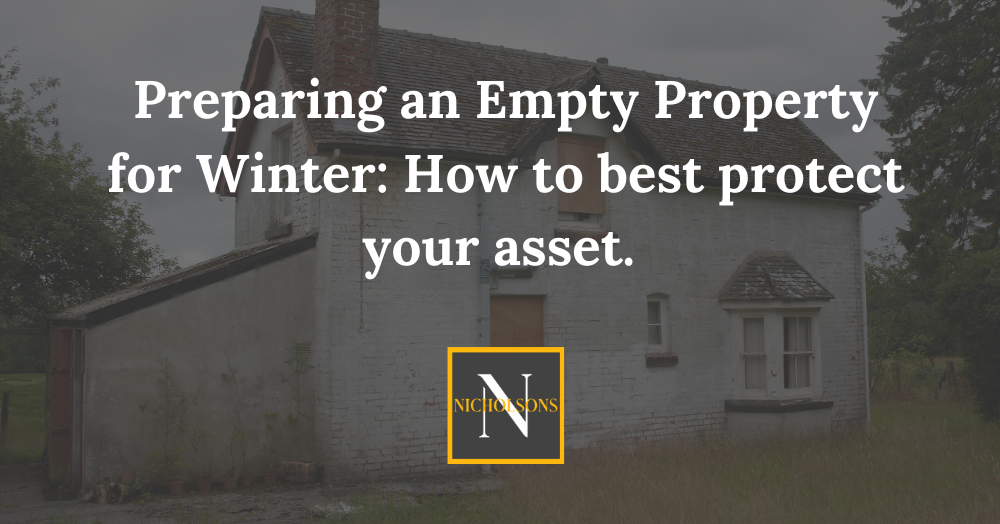Preparing an Empty Property for Winter: How to best protect your asset.
As the colder months approach, ensuring empty properties are adequately prepared is paramount. Proactive measures can prevent costly damage and maintain your investment's value, offering peace of mind during the winter season.

There are many reasons why you may have an empty property, but regardless of the reason the transition to colder weather brings a unique set of challenges for vacant properties. Freezing temperatures, damp, and reduced daylight hours can all contribute to significant issues if not addressed promptly. This guide outlines the critical steps to take to safeguard an empty property, ensuring they remain in good condition.
Protecting Against Burst Pipes and Water Damage
Burst pipes are arguably the most common and damaging winter hazard for empty properties. The resulting water damage can be extensive and expensive to repair. To mitigate this risk, consider the following:
- Drain Down the System: If a property will be vacant for an extended period, especially during severe cold snaps, draining the water system is the most effective preventative measure. This involves turning off the main stopcock, opening all taps (hot and cold), and flushing toilets until no more water runs. Remember to also drain the central heating system if it's not going to be used.
- Maintain Heating: For shorter vacancies, or if draining is not feasible, set the thermostat to a minimum temperature, typically between 10-14°C. This prevents pipes from freezing and keeps the property aired, reducing damp.
- Insulate Pipes: Ensure all exposed pipes, particularly those in lofts, basements, or external walls, are properly insulated with lagging.
- Check for Leaks: Before winter sets in, conduct a thorough inspection for any existing leaks or drips. Even minor leaks can freeze and expand, causing significant damage.
Preventing Damp and Mould
Damp and mould thrive in cold, unventilated environments, which empty properties can easily become. These issues not only cause structural damage but also make a property less appealing and potentially unhealthy for future buyers or tenants.
- Ventilation: Even in an empty property, some level of ventilation is crucial. Consider installing trickle vents or leaving internal doors ajar to allow air circulation. If possible, visit regularly to open windows for a short period, especially on milder days.
- Dehumidifiers: For properties prone to damp, a dehumidifier can be an invaluable tool. Ensure it has a large reservoir or a continuous drainage option if you cannot empty it frequently.
- Check for Entry Points: Inspect the roof, gutters, windows, and doors for any cracks or gaps that could allow moisture ingress. Repair these promptly.
Security Measures
Empty properties can be targets for vandals or burglars, especially during darker winter months. Enhanced security is a must.
- Robust Locks: Ensure all windows and doors have high-quality, secure locks.
- Alarm Systems: A monitored alarm system provides an excellent deterrent and immediate notification in case of a breach.
- Lighting: External security lighting, particularly motion-sensor lights, can deter unwanted visitors.
- Regular Checks: Arrange for regular property checks by yourself, a trusted neighbour, or your estate agent. This presence can deter criminals and allow for early detection of any issues.
General Maintenance and Preparation
Beyond the immediate winter threats, a few general maintenance tasks will ensure your property is in top shape.
- Clear Gutters and Drains: Blocked gutters can lead to overflowing water, which can freeze and cause damage to walls and foundations. Clear them of leaves and debris.
- Garden Maintenance: Trim back any overgrown trees or bushes that could cause damage in high winds or block light. Ensure external taps are turned off and drained.
- Inform Your Insurer: Always inform your property insurance provider if a property will be vacant for an extended period, as many policies have specific clauses regarding unoccupied properties. Failure to do so could invalidate your cover.
By taking these proactive steps, property owners can significantly reduce the risks associated with empty properties during the colder months.


